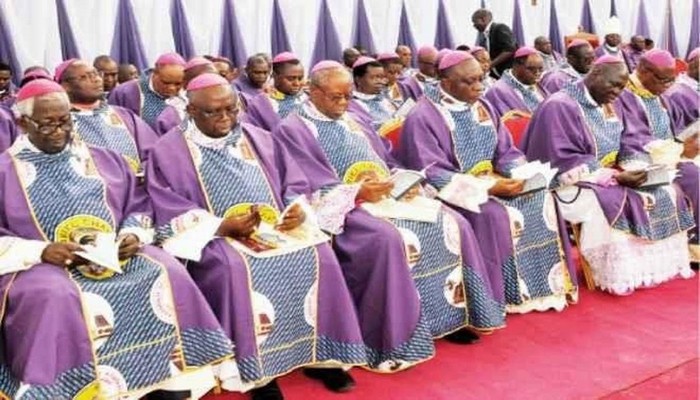Blessing same-sex marriage against God’s law, cultural sensibilities of Nigerians – Catholic bishops

Catholic Bishops Conference of Nigeria (CBCN) has said that blessing same-sex marriage is against God’s law, teachings of the Church, the laws of the country and the cultural sensibilities of Nigerians.
The bishops stated this in a statement made available to the News Agency of Nigeria (NAN) on Thursday in Ibadan.
NAN reports that the statement was signed by CBCN President and Secretary, Most Rev. Lucius Ugorji and Most Rev. Donatus Ogun respectively and a few other executives.
The bishops assured the ‘people of God’ that the teachings of the Catholic Church on marriage remained the same.
“There is, therefore, no possibility in the church of blessing same-sex unions and activities; that will go against God’s law, the teachings of the church, the laws of our nation and the cultural sensibilities of our people.
“We thank all the priests for their accompaniment of married couples, asking them to continue in all they do to sustain the sacrament of holy matrimony and never to do anything that will detract from the sacredness of this sacrament,” CBCN said.
The bishops said following the issuance of the declaration on the pastoral meaning of blessings, “Fiducia Supplicans” (pleading with courage) by the Dicastery for the Doctrine of the Faith, CBCN members recognised their duties as pastors to clarify the content of the document.
They emphasised that the declaration sought to clarify the different forms of blessings that could be given to persons and objects within the Catholic Church, including the possibility of blessing persons in irregular unions.
Such unions, the clerics said, could include, but not limited to, divorced and remarried couples whose previous marriages had not been annulled, those living in same-sex unions, those in polygamous unions and concubinage, among others.
“The declaration acknowledges and carefully distinguishes between ritual, liturgical and informal blessings.
“While ritual or liturgical blessings are imparted according to the established norms of the church, informal blessings refer to prayers over people who ask for them outside the liturgy or any formal celebration in the church.
“The declaration offers a consideration of the possibility of extending the informal blessings to all God’s children, irrespective of their moral condition, when they ask to be blessed.
“Nevertheless, the declaration insists that the blessings of persons in irregular unions – and never the union itself – can only take a non-liturgical form to avoid confusion.
“It should not be imparted during or in connection with a civil wedding ceremony or with clothing, words and signs associated with a wedding,” they said.
According to the bishops, the declaration also reiterates the Catholic Church’s perennial teaching on marriage as an “exclusive, stable and indissoluble union of a man and woman, naturally open to the generation of children.”
While stating that the church did not have the power to impart a blessing on irregular unions, they maintained that the declaration also reinforced the truth about God’s mercy.
“For one to willingly ask for a blessing demonstrates one’s trust in God and the desire to live according to God’s commandments.
“Asking for God’s blessing is not dependent on how good one is. Imperfection is the reason for seeking God’s grace.
“Therefore, those in irregular unions are invited never to lose hope but rather to ask for God’s grace and mercy while remaining open to conversion,” the bishops said.






